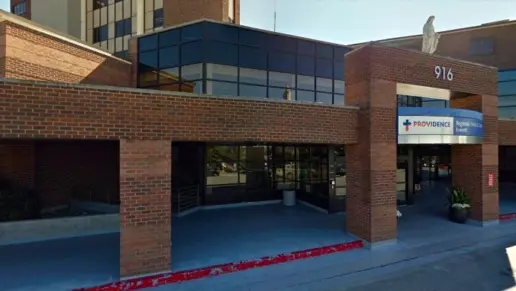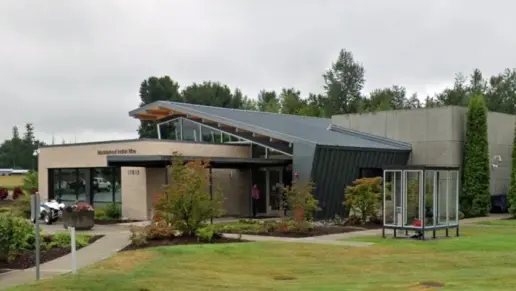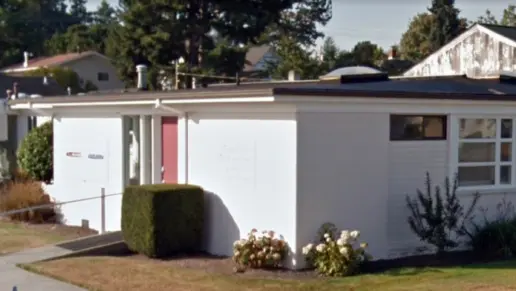This place was amazing, energy from this place is something I cannot explain, it is just so peaceful and calming. Even my visitors felt this and wouldn't want to leave. The counselors and support staff make such a wonderful sense of community, most of which are recovering a ...
About Olalla Recovery Centers, Lala Cove Lane Southeast, Olalla, WA
Olalla Recovery Centers provides substance abuse treatment for adults. They offer inpatient (IP) services at this location but can refer those needing more flexible options to their outpatient (OP) program area. You’ll find ‘em out in Olalla, Washington.
Your recovery starts with a thorough assessment to determine your unique needs. It also helps the team develop a care plan focused on your treatment goals. The residential center is in a serene, wooded location that encourages recovery. Their approach focuses on the spiritual, mental, and physical aspects of addiction and healing.
Individual counseling provides time with a skilled professional who can help you uncover the root causes of your addiction challenges. You can discuss personal issues you may not want to share in a group setting, develop healthy coping skills, recognize substance triggers, and learn relapse prevention methods.
Group sessions allow time with others who can provide feedback related to sobriety and addiction. It gives you a supportive network of like-minded people sharing the goal of long-term sobriety.
Olalla Recovery Centers offer non-medical detox management assistance. For those needing medication-assisted treatment (MAT) or more acute care, they provide referrals to outside agencies. They also accept residents using medication management with FDA-approved medicines for recovery and work with local medical providers and detox centers to help with the stabilization phase.
They have gender-specific groups to address conditions and concerns that men and women may have related to addiction and recovery. The team believes that separate groups may help examine these issues with more clarity.
The Guest Lodge also has a track for Native Americans. They provide traditional healing practices and holistic therapies. That way, you can go back to your roots to find yourself and a guide to rebuild your life in healthy ways.
The center accepts most commercial health insurance plans and provides financing for those who need more payment assistance.
Latest Reviews
Rehab Score
Gallery
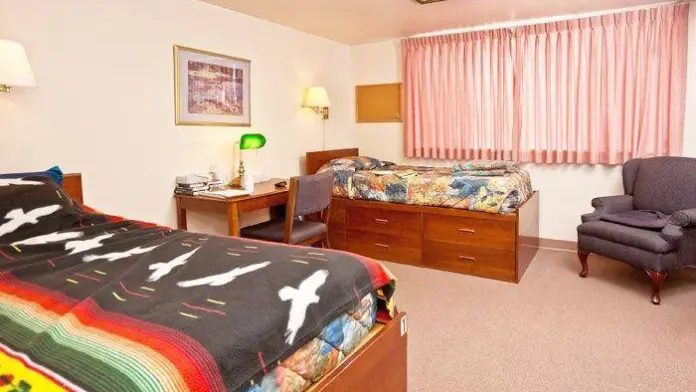
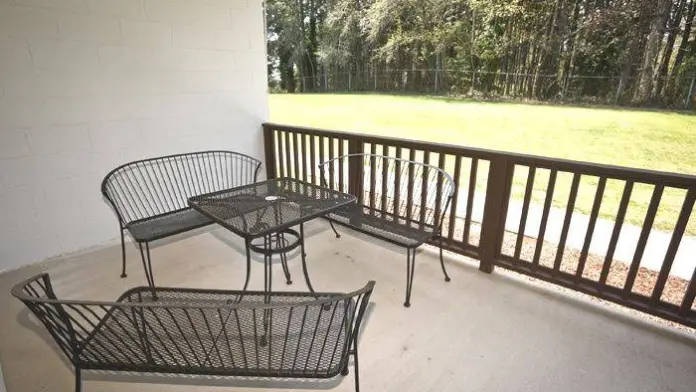
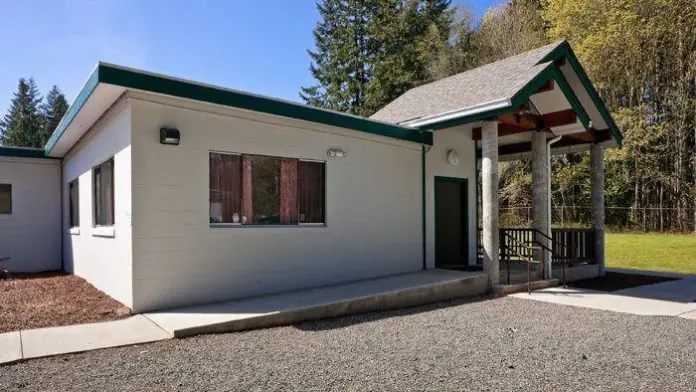
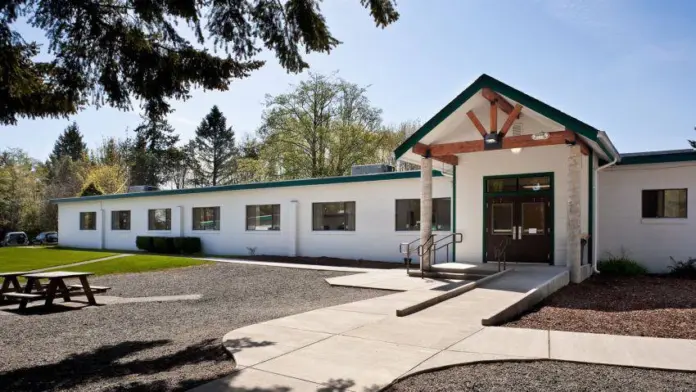
Location
Accepted Insurance

















Other Forms of Payment
Medicaid is a state based program that helps lower-income individuals and families pay for healthcare. Medicaid covers addiction treatment so those enrolled can use their coverage to pay for rehab. When a program accepts Medicaid the client often pays very little or nothing out of their own pocket.
Private insurance refers to any kind of healthcare coverage that isn't from the state or federal government. This includes individual and family plans offered by an employer or purchased from the Insurance Marketplace. Every plan will have different requirements and out of pocket costs so be sure to get the full details before you start treatment.
Self-pay involves paying for treatment out of your own pocket. You can use savings or credit, get a personal loan, or receive help from family and friends to fund your treatment. If you don't have insurance or your insurance plan doesn't cover a specific program, self-pay can help ensure you still get the care you need.
Financial aid can take many forms. Centers may have grants or scholarships available to clients who meet eligibility requirements. Programs that receive SAMHSA grants may have financial aid available for those who need treatment as well. Grants and scholarships can help you pai for treatment without having to repay.
Sliding scale payments are based on a client's income and family size. The goal is to make treatment affordable to everyone. By taking these factors into account, addiction recovery care providers help ensure that your treatment does not become a financial burden to you or your family, eliminating one barrier to care.
Military members, veterans, and eligible dependents have access to specific insurance programs that help them get the care they need. TRICARE and VA insurance can help you access low cost or no cost addiction and mental health treatment. Programs that accept military insurance often have targeted treatment focused on the unique challenges military members, veterans, and their families face.
Addiction Treatments
Levels of Care
Treatments
The goal of treatment for alcoholism is abstinence. Those with poor social support, poor motivation, or psychiatric disorders tend to relapse within a few years of treatment. For these people, success is measured by longer periods of abstinence, reduced use of alcohol, better health, and improved social functioning. Recovery and Maintenance are usually based on 12 step programs and AA meetings.
Effective drug rehab in Washington integrates care for the whole person, offering comprehensive solutions to addiction. Treatment methods address mental, physical, and relational aspects of substance abuse.
A combined mental health and substance abuse rehab has the staff and resources available to handle individuals with both mental health and substance abuse issues. It can be challenging to determine where a specific symptom stems from (a mental health issue or an issue related to substance abuse), so mental health and substance abuse professionals are helpful in detangling symptoms and keeping treatment on track.
Programs


Clinical Services
Cognitive Behavioral Therapy (CBT) is a therapy modality that focuses on the relationship between one's thoughts, feelings, and behaviors. It is used to establish and allow for healthy responses to thoughts and feelings (instead of unhealthy responses, like using drugs or alcohol). CBT has been proven effective for recovering addicts of all kinds, and is used to strengthen a patient's own self-awareness and ability to self-regulate. CBT allows individuals to monitor their own emotional state, become more adept at communicating with others, and manage stress without needing to engage in substance abuse.
Creativity is inherently healing, and can help those in recovery express thoughts or feelings they might not otherwise be able to. Creative arts therapy can include music, poetry/writing, painting, sculpting, dance, theater, sandplay, and more. Unlike traditional art, the final product matters far less than the experience of creation and expression itself.
Dialectical Behavior Therapy (DBT) is a modified form of Cognitive Behavioral Therapy (CBT), a treatment designed to help people understand and ultimately affect the relationship between their thoughts, feelings, and behaviors. DBT is often used for individuals who struggle with self-harm behaviors, such as self-mutilation (cutting) and suicidal thoughts, urges, or attempts. It has been proven clinically effective for those who struggle with out-of-control emotions and mental health illnesses like Borderline Personality Disorder.
Experiential therapy is a form of therapy in which clients are encouraged to surface and work through subconscious issues by engaging in real-time experiences. Experiential therapy departs from traditional talk therapy by involving the body, and having clients engage in activities, movements, and physical and emotional expression. This can involve role-play or using props (which can include other people). Experiential therapy can help people process trauma, memories, and emotion quickly, deeply, and in a lasting fashion, leading to substantial and impactful healing.
EMDR is a therapeutic modality originally developed to help process trauma. In an EMDR session, a patient is prompted to undergo eye movements that mimic those of REM sleep. This is accomplished by watching a therapist's finger move back and forth across, or following a bar of light. The goal is repetitive sets of eye movements that help the brain reprocess memory, which can significantly reduce the intensity of remembered traumatic incidents. Associated memories can heal simultaneously, leaving patients significantly calmer, more stable, and more emotionally relaxed.
Olalla Recovery sees the importance of family within the disease of addiction. The patient is not the only one experiencing the issues and problems of addiction, the entire family is in need of assistance. This is why they encourage families to participate in their Family Program. Families are an integral part of the recovery process for patients and healing for everyone involved is vital.
Group therapy is any therapeutic work that happens in a group (not one-on-one). There are a number of different group therapy modalities, including support groups, experiential therapy, psycho-education, and more. Group therapy involves treatment as well as processing interaction between group members.
Olalla Recovery Centers believes a combination of clinical, group and holistic therapies works best to heal each person on multiple levels. Individual primary counseling sessions help restore balance from the inside out, the patient is provided individualized assignments to help them change, feel better and start the road to recovery.
Motivational Interviewing (MI) is a clinical approach to helping people with substance abuse issues and other conditions shift behavior in positive ways. It is more goal-oriented than traditional psychotherapy, as MI counselors directly attempt to get clients to consider making behavioral change (rather than wait for them to come to conclusions themselves). Its primary purpose is to resolve ambivalence and help clients become able to make healthy choices freely.
Nicotine Replacement Therapy (NRT) is a way of getting nicotine into the bloodstream without smoking. It uses products that supply low doses of nicotine to help people stop smoking. The goal of therapy is to cut down on cravings for nicotine and ease the symptoms of nicotine withdrawal.
Healing the whole self including the body is essential in recovery. Patients receive exceptional meals that are balanced and complete to replenish their bodies with wholesome nutrients. Patients participate in nutrition education lectures and classes. The fitness trail that encircles the property is conducive to meditation, reflection and exercise. Additional physical activities include basketball, volleyball and horseshoes.
Trauma therapy addresses traumatic incidents from a client's past that are likely affecting their present-day experience. Trauma is often one of the primary triggers and potential causes of addiction, and can stem from child sexual abuse, domestic violence, having a parent with a mental illness, losing one or both parents at a young age, teenage or adult sexual assault, or any number of other factors. The purpose of trauma therapy is to allow a patient to process trauma and move through and past it, with the help of trained and compassionate mental health professionals.
Amenities
-
Residential Setting
-
Private Setting
-
Yoga Studio
-
Hiking
Accreditations

The Commission on Accreditation of Rehabilitation Facilities (CARF) is a non-profit organization that specifically accredits rehab organizations. Founded in 1966, CARF's, mission is to help service providers like rehab facilities maintain high standards of care.
CARF Accreditation: Yes
Accreditation Number: 27591

LegitScript has reviewed Olalla Recovery Centers, Lala Cove Lane Southeast, Olalla, WA as part of their certification program, and has determined that it meets the LegitScript standards for legality, safety and transparency.
LegitScript verified in July 2020

The Substance Abuse and Mental Health Services Administration (SAMHSA) is a branch of the U.S. Department of Health and Human Services. Established in 1992 by congress, SAMHSA's mission is to reduce the impact of substance abuse and mental illness on American's communities.
SAMHSA Listed: Yes

State Licenses are permits issued by government agencies that allow rehab organizations to conduct business legally within a certain geographical area. Typically, the kind of program a rehab facility offers, along with its physical location, determines which licenses are required to operate legally.
State License: Washington
License Number: 007000
Contact Information
12850 Lala Cove Lane SE
Olalla, WA 98359
















